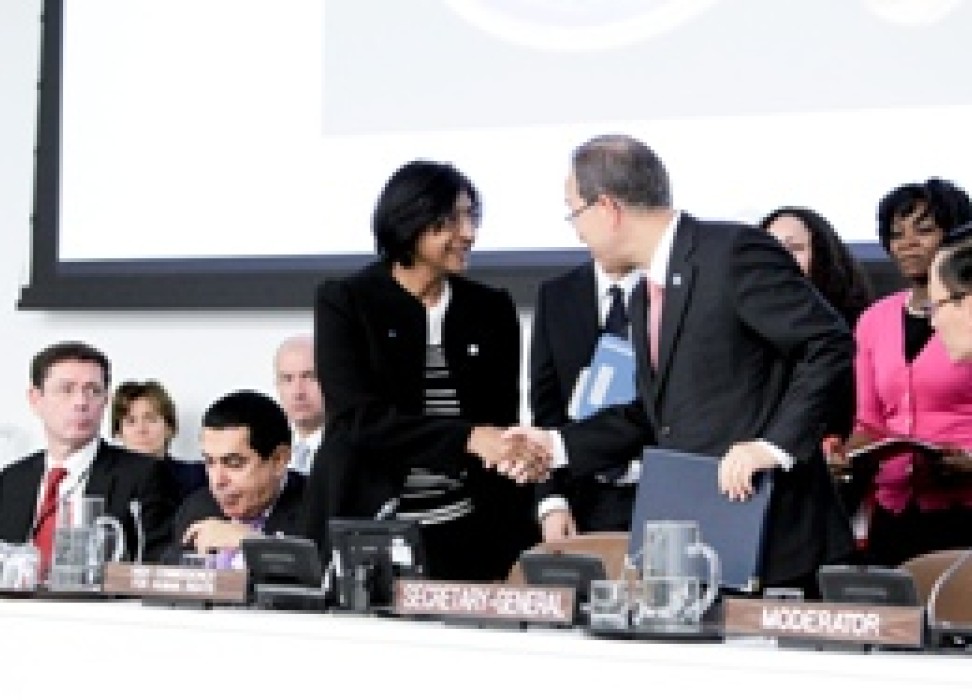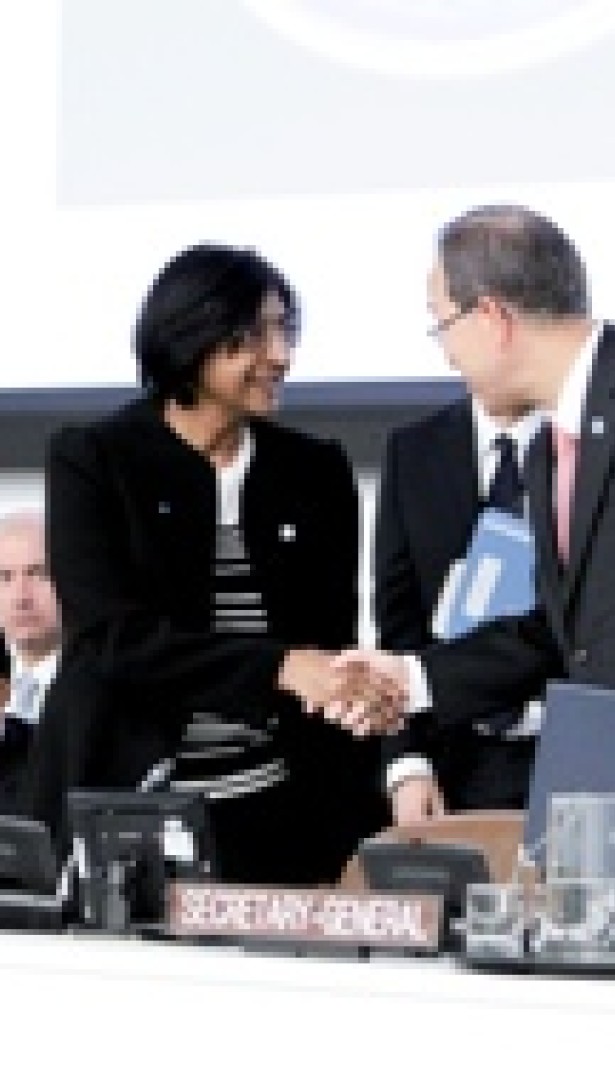Stronger treaty monitoring for better human rights results
04 April 2012

The human rights treaties are one of the success stories of the UN’s efforts to protect and promote human rights around the world. Member states have shown increasing willingness to accept the obligations set out in the treaties with more than 1,500 ratifications since the first treaty was created in 1966.
Yet ratification alone is not enough. As Felice Gaer, member of the Committee against Torture, explained at a meeting of states in New York, April 2 – 3, to discuss the future of the treaty system, “It’s about the 3 Rs: Ratification, Reporting and Results”.
And results, concrete action to improve human rights, are the most important of the three.
The Committee against Torture is one of the ten United Nations human rights treaty bodies that meet for a combined 73 weeks every year to assess countries’ compliance with their human rights obligations under international law.
Comprising human rights experts who serve in their personal capacity, the treaty bodies examine reports submitted by countries, discuss with government representatives areas of concern, and recommend measures the country in question should take to meet its human rights obligations. Some of the treaty bodies also consider victims’ complaints of human rights violations.
The capacity of the treaty bodies to perform these vital functions has become increasingly stretched. Although, over the last decade, the number of treaty bodies has increased from 6 to 10, the number of their sessions from 11 to 24, and the number of their work weeks from 44 to 73, the amount of resources to support their work has hardly changed.
“Human rights are at the heart of the UN system, and treaty bodies are at the heart of the UN human rights machinery,” says Secretary-General Ban Ki-moon. “We cannot afford to undermine these critical engines of the human rights protection system. We must strengthen them.”
At the New York meeting, Ban called for increased resources to support the work of treaty bodies, describing them as the indispensable link between universal standards and the individuals they are designed to protect.
In February, the General Assembly resolved to create an intergovernmental process for strengthening the human rights treaty body system.
“It is important that this process will complement the Geneva-based efforts by financially supporting the expansion of the treaty body system and, at the same time, preserving its independence,” Mr. Ban said in his remarks.
The treaty bodies are created in accordance with the provisions of the respective human rights treaty they monitor. The UN Human Rights Office which has its headquarters in Geneva provides them with secretariat support.
“A weakened treaty body system would have a far-reaching, detrimental effect not only for its immediate beneficiaries but also for the entire United Nations human rights machinery…as well as the global human rights movement,” warned Navi Pillay, the United Nations High Commissioner for Human Rights, who convened the meeting.
Pillay said that the treaty body recommendations, observations and general comments are useful implementation guidance tools for States and provide a constructive advocacy platform for national human rights institutions and civil society.
“We are all aware of the financial constraints currently facing the United Nations system, and indeed of the whole world. However, the fundamental principle of States’ accountability under international human rights law must not be compromised because of a lack of resources,” she said.
Commenting on the inter-governmental process on strengthening human rights treaty bodies that will take place in New York, the President of the General Assembly, Nassir Abdulaziz Al-Nasser, said his main objective will be to build unity.
“This process will also work to improve the impact of the human rights treaty bodies on rights-holders and duty-bearers at the national level, by strengthening their work, while fully respecting their independence.” he said.
During the two day meeting, many ideas on how the system could be strengthened were discussed. There was general agreement that ratifying new treaties and reporting to Geneva were not ends in themselves. The treaty bodies exist to help states achieve results on the ground in terms of human rights protection, for the benefit of everyone.
Yet ratification alone is not enough. As Felice Gaer, member of the Committee against Torture, explained at a meeting of states in New York, April 2 – 3, to discuss the future of the treaty system, “It’s about the 3 Rs: Ratification, Reporting and Results”.
And results, concrete action to improve human rights, are the most important of the three.
The Committee against Torture is one of the ten United Nations human rights treaty bodies that meet for a combined 73 weeks every year to assess countries’ compliance with their human rights obligations under international law.
Comprising human rights experts who serve in their personal capacity, the treaty bodies examine reports submitted by countries, discuss with government representatives areas of concern, and recommend measures the country in question should take to meet its human rights obligations. Some of the treaty bodies also consider victims’ complaints of human rights violations.
The capacity of the treaty bodies to perform these vital functions has become increasingly stretched. Although, over the last decade, the number of treaty bodies has increased from 6 to 10, the number of their sessions from 11 to 24, and the number of their work weeks from 44 to 73, the amount of resources to support their work has hardly changed.
“Human rights are at the heart of the UN system, and treaty bodies are at the heart of the UN human rights machinery,” says Secretary-General Ban Ki-moon. “We cannot afford to undermine these critical engines of the human rights protection system. We must strengthen them.”
At the New York meeting, Ban called for increased resources to support the work of treaty bodies, describing them as the indispensable link between universal standards and the individuals they are designed to protect.
In February, the General Assembly resolved to create an intergovernmental process for strengthening the human rights treaty body system.
“It is important that this process will complement the Geneva-based efforts by financially supporting the expansion of the treaty body system and, at the same time, preserving its independence,” Mr. Ban said in his remarks.
The treaty bodies are created in accordance with the provisions of the respective human rights treaty they monitor. The UN Human Rights Office which has its headquarters in Geneva provides them with secretariat support.
“A weakened treaty body system would have a far-reaching, detrimental effect not only for its immediate beneficiaries but also for the entire United Nations human rights machinery…as well as the global human rights movement,” warned Navi Pillay, the United Nations High Commissioner for Human Rights, who convened the meeting.
Pillay said that the treaty body recommendations, observations and general comments are useful implementation guidance tools for States and provide a constructive advocacy platform for national human rights institutions and civil society.
“We are all aware of the financial constraints currently facing the United Nations system, and indeed of the whole world. However, the fundamental principle of States’ accountability under international human rights law must not be compromised because of a lack of resources,” she said.
Commenting on the inter-governmental process on strengthening human rights treaty bodies that will take place in New York, the President of the General Assembly, Nassir Abdulaziz Al-Nasser, said his main objective will be to build unity.
“This process will also work to improve the impact of the human rights treaty bodies on rights-holders and duty-bearers at the national level, by strengthening their work, while fully respecting their independence.” he said.
During the two day meeting, many ideas on how the system could be strengthened were discussed. There was general agreement that ratifying new treaties and reporting to Geneva were not ends in themselves. The treaty bodies exist to help states achieve results on the ground in terms of human rights protection, for the benefit of everyone.
Statement of UN Secretary-General Ban Ki-moon
Opening address by Ms. Navi Pillay, United Nations High Commissioner for Human Rights
Closing remarks by Assistant Secretary-General for Human Rights Ivan Šimonović
New York consultations on strengthening the human rights treaty system
The treaty bodies strengthening process
Opening address by Ms. Navi Pillay, United Nations High Commissioner for Human Rights
Closing remarks by Assistant Secretary-General for Human Rights Ivan Šimonović
New York consultations on strengthening the human rights treaty system
The treaty bodies strengthening process

